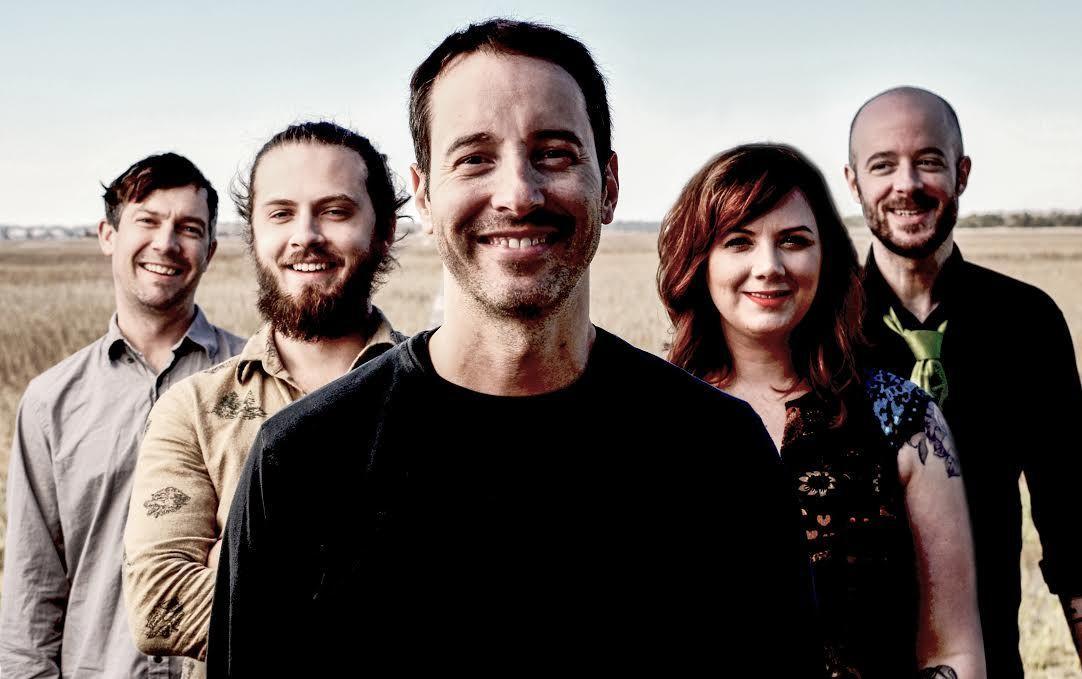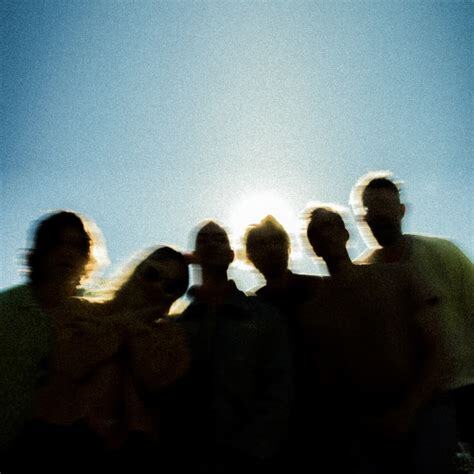For the past 18 years, Yonder Mountain String Band has stood as the shining example of how bluegrass music can appeal to a far larger audience than most would imagine.
By pushing the envelope of the genre with its characteristic rock n’ roll influences and improvisational performances, the five-piece group built a massive and dedicated international following.
The group’s latest album, “Black Sheep,” was released June 2015.
Yonder Mountain String Band will be performing at Varsity Theatre on Sunday, April 3.
The Daily Reveille sat down with guitarist Adam Aijala to discuss the band’s upcoming show, new music and more.
The Daily Reveille: Your latest album, “Black Sheep,” was the first album the band has produced entirely on its own. How did that affect the final project?
Adam Aijala: In a lot of ways, having an outsider as a producer is a really good thing. It’s almost like having a fifth Beatle mentality with George Martin. There’s an extra brain in there that’s not sitting with you on stage every night that has a certain objectivity to the music that we can’t possibly have. Everything we do is so subjective. Doing it ourselves was interesting in that all of the ideas were coming from us as opposed to the producer, who’s just an extra person to say, ‘Why don’t you try this? Why don’t you try that?’ A producer, for the capacity of the records that we’ve done in the past – that’s been their major role. Sometimes it’s been really important in the creation of a song and other times it’s something really subtle that unless I pointed it out, you probably wouldn’t even know. A lot of the time you run into the issue where you make everything so democratic and you don’t have someone like a producer that can help make a decision if you run into the “too many cooks in the kitchen” kind of thing, where there’s a lot of ideas going around. Sometimes you have to have someone to say, ‘Let’s just do this so we can move on.’
TDR: What are some of the themes and inspirations that led to the writing of “Black Sheep?”
AA: I have a couple of songs that tell stories. Ben [Kaufmann] is someone who likes to tell stories more. My topics tend to be about either relationships or traveling on the road. Not just love interests, you know? I’ve been married a long time. Friendships and everything in between. You have so many relationships and you get new ones all the time just being in this position where we’re traveling so much. We’re always meeting people. Obviously, being on the road is a huge part of what we do. Speaking personally, that’s where a lot of my ideas come from. I like to be less literal in lyrics even though there’s definitely a meaning to the songs that I write, a lot of the time it’s not obvious. I like it like that. I don’t mind literal lyrics now and again, and I love story songs, too. I just don’t really do that. For us collectively, it was a collaboration of what songs we were writing at the time. Granted, recording everything in the same space and having the same tones musically song-to-song, it’s going to have that air of continuity. But lyrically, a lot of stuff does gel together because we have all different people writing music. For this album, specifically, we had three different writers. When you have one songwriter, it’s a lot easier to have a more cohesive album because it’s one person coming up with all of the lyrics. Concept albums and things like that. I’d love to do something like that. Ben’s written a whole series of songs that pertain to one story that he started when the band first started like 18 years ago. We’re working on an album now, actually. We’ve only done two sessions but we have nine basic tracks laid down.
TDR: Who does most of the group’s songwriting? Is it sometimes hard to find inspiration for new music spending so much time on the road?
AA: Between the three of us, Ben probably has the most songs. Lately, it’s been Dave [Johnson]. I write a lot with Dave, as well. Dave writes all the time. Dave’s one of those guys that carries a little notebook with him. He’s not writing lyrics all the time, but he’s writing all the time. On the road, he likes to have one or two hours of writing time every day. He has this practice regimen that I’m impressed by. He’s always been writing. Even when he was younger, he did it a lot, whereas I wasn’t that guy. So when you say, ‘Is it hard to find inspiration?’ Yeah, but I don’t look for it. When something comes to me, I roll with it. I’m not like, ‘Damn, I didn’t write a song in a week.’ Especially when you’re on the road, you’re just kind of going with the flow. A lot of the times when you’re on the road is when you get a weird idea. Maybe it’s because you’re around so much music. There’s no rhyme or reason for me why all of a sudden I have an idea for a melody or a lyric or something. I’ve written songs starting with just a few words, a melody or even just chords. Lately, it seems like it’s music first, lyrics later, but it doesn’t always go that way. Actually, one of the songs on the new record has lyrics that were written recently but the melody and guitar lick is from 2011. I just record ideas all the time, so I have a bunch of old recordings on my voice memos on my phone that go way back. Every time I get an idea, I record it, because you never know. Dave and I write really well together. Some people are so beholden to their ideas that they’re not willing to change or edit things. There’s some times where I’ll say, ‘I really want to try to find a spot for that line.’ That line might be in the chorus, but Dave might have a better idea for the chorus and we end up using that line in one of the verses or in the bridge or something like that. As long as you’re not too beholden to your ideas, I think you can accomplish a lot more. That goes for music, lyrics, the format of the song, all of that.
TDR: Yonder Mountain String Band has played everything from small, intimate venues to massive festivals. Which do you prefer? Is it ever difficult transitioning between the two?
AA: I really enjoy playing festivals because it’s a great opportunity, especially if it’s an out-of-the-box festival for us. Even something like Bonnaroo’s out-of-the-box because it has such an eclectic lineup. Bluegrass, or alternative bluegrass, whatever you want to call what we do, is pretty damn small compared to the type of bands that are playing Bonnaroo. I like that because it puts us in front of a bunch of new people. You’re hoping to turn people on who have never seen you. But at most festivals, you don’t get a sound check and you only get X amount of time. The festival slots that we play, in general, are between 75 and 90 minutes, which is basically one set of our nightly show. We’ve been doing one set shows now and again, like on Mondays and Tuesdays we’ll just play one two hour set plus encore. So doing festivals, you kind of just have to go out there and throw it at them because you don’t have a whole lot of time to build the show. It’s usually more energy-packed stuff, even though all of our music is pretty high-energy. We’ll just do more jammers. You can look it at it slightly different in that sense. You have a shorter period of time to build the show, whereas at a small venue or an intimate setting where you’re playing two sets you can kind of set a stage over two sets. I think I like both. I like playing small places. In fact, if economics wasn’t a part of doing what we do, which it obviously is, if I could make the same money, I think I’d probably prefer playing small, intimate places. I enjoy it as a fan, too. There was this venue up in Colorado where the band started that held like 70 people and it was literally a house and it had a little stage where I saw some of the best shows I’ve ever seen. We played in there a bunch, too. I look at those as fondly as the best rock shows I’ve ever been to.
TDR: What can you tell me about Yonder Mountain String Band’s new project?
AA: It’s really in the early stages. We’re almost done with basic tracking. We might record two or three more songs so we have stuff to choose from so we don’t have to say, ‘We have these songs and they all have to end up on the record.’ We can have more than we need and we can release a couple of early tracks that aren’t going to be on the record. As of right now, there are nine basic tracks and we have six brand new songs, one older song that we’ve barely ever played and two other songs that we’ve been playing that are still on the newer side. It’s kind of more eclectic than “Black Sheep.” There’s a reggae song we recorded, we have a couple bluegrass fast ones and some have a funkier tempo and are blues-sounding. No outside musicians on it as of yet. We might try to get some guests on some songs if we can. We have some really cool ideas about how we want this record to flow. If all goes according to plan, it’ll be done in the vein of “Black Sheep” but it’ll have a different feel altogether. I’m really happy with the new songs. I just hate waiting for the album to come out when you have these six new songs that we should be playing on stage.
TDR: What can we expect to see at your upcoming show at Varsity Theatre?
AA: Expect fast, high-energy extended experimentation sections in songs and plan on having a good time. Plan on smiling. There’ll be smiles.
Q&A: Yonder Mountain String Band discusses writing process, upcoming performance
March 30, 2016
More to Discover









